Master’s Degree in Islamic Studies
Master in Islamic Studies Program Overview
Program vision:
That the Islamic Studies program - MA - achieve local leadership and regional excellence in the field of Islamic sciences.
Program Mission:
The Master’s Program in Islamic Studies seeks to prepare high-quality specialized cadres in the field of humanities, and provide them with the knowledge and research skills necessary to achieve scientific excellence and optimal use of knowledge and research by providing a distinguished teaching staff and an appropriate educational and research environment in light of the values and needs of society and in accordance with academic accreditation standards.

Master in Islamic Studies Program Goals and Features
Program Goals
The objectives of the Master of Islamic Studies program are the following:
- اعداد كفاءات علمية وبحثية متخصصة في مجال الدراسات الإسلامية المختلفة وفقاً لاحتياجات سوق العمل.
- تقديم حلول للمشكلات الاجتماعية والإنسانية من خلال إجراء البحوث العلمية.
- اكتساب الطلبة المعارف والمهارات المختلفة في مجال الدراسات الإسلامية بما يسهم في نشر المفاهيم الإسلامية الصحيحة وتربية الأجيال وتوعية المجتمع.
Program Features
- Full-time qualified teaching staff, scientifically and practically qualified.
- Locally - regionally accredited certificate.
- Modern curricula that meet quality requirements and standards.
- An appropriate learning environment.
Master’s Degree in Islamic Studies Admission Requirements
- الحصول على درجه البكالوريوس من جامعه معترف بها بتقدير لا يقل عن جيد أو ما يعادله.
- Pass the differentiation exams set by the Deanship of Graduate Studies and Practical Research.
- Obtaining a TOEFL score or its equivalent in the English language according to the degree determined by the college in which the student studies (a graduation requirement).
- To undergo and pass the remedial courses successfully (if any).
- Pass the Arabic language exam at the university specially prepared for non-native speakers.
- Fulfilling any special conditions recommended by the scientific department, provided that they do not conflict with the provisions of these regulations.
- The applicant should not have been dismissed from any other university for disciplinary reasons.
- The applicant must fulfill the prescribed financial obligations.
- The applicant should not be enrolled in another postgraduate program at the university.
- Any other conditions set by the Deanship of Graduate Studies and Practical Research or the Ministry of Higher Education and Scientific Research.

Master of Islamic Studies Objectives
- Create a practical and conducive learning environment, which aligns with the standards of local and international quality and accreditation
- To contribute in shaping the Islamic personality that reflects proper aspects and values in behaviours and attitudes
- To promote core Islamic values in education, scientific research and community services
- To provide a set of unique educational provisions and outcomes for postgraduate levels, with continuous improvement.
- To enhance students’ research and communication skills
- تخريج كادر كفؤ لتلبية احتياجات سوق العمل
- To enrich the general knowledge in specialized aspects of Islamic studies and scientific research in an endeavour to reach renowned implications in the field of Islamic studies in Yemen
- To nurture program partnerships with international sectors of various types, to provide a noble societal service.
- To promote specialized scientific research work in aspects of prophetic Sunnah, Islamic studies as well as modern issues.
- To activate a state of mutual continuation and commitment between the university and the society in Yemen
Master of Islamic Studies Program Outcomes
يسعى برنامج ماجستير الدراسات الإسلامية إلى إعداد خريج مؤهل يمتلك من القدرات المميزة في مجال الدراسات الإسلامية ومهارات البحث العملي ذات الصلة، وذلك تماشياً مع أهداف قسم الدراسات الإسلامية، والهادف لنشر الفكر الإسلامي وبيان مبادئه السامية. كما يسعى البرنامج إلى توفير أحدث الوسائل التقنية والتي من شأنها مساعدة الطالب في الحصول على المعرفة الصحيحة مع نقدها، وهو ما يشكل الحجر الأساس في بناء شخصية الخريج المنشود والتركيز على مهارته القيادية والدينية التي تعكس التراث الإسلامي العريق.
Contact Us
